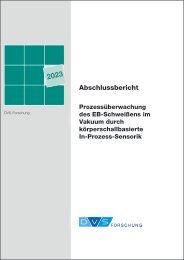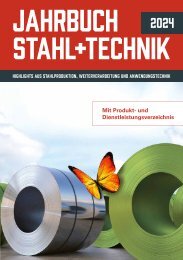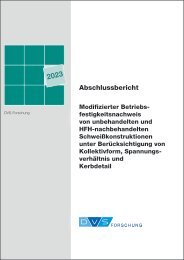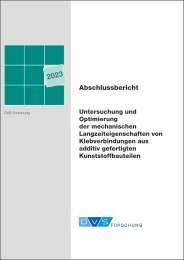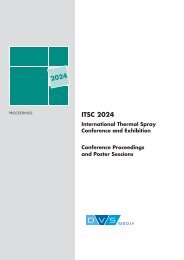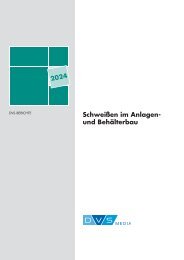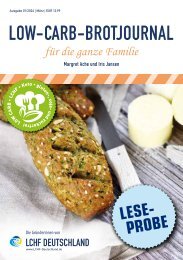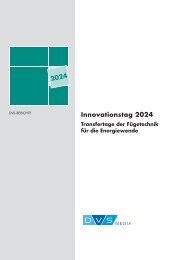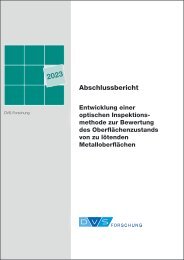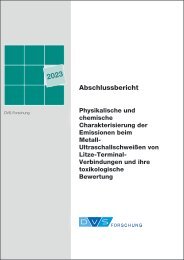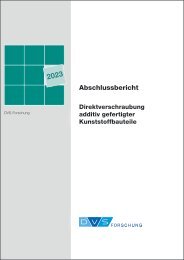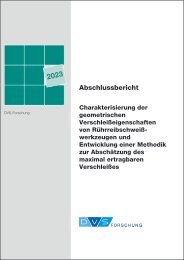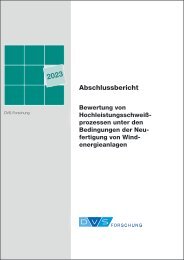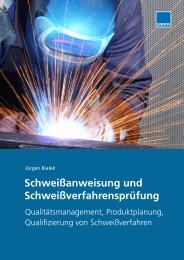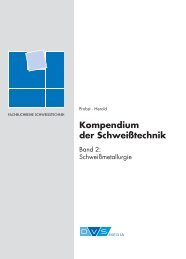STEEL + TECHNOLOGY 01/2020 EXTRACT
STEEL + TECHNOLOGY 01/2020 EXTRACT
STEEL + TECHNOLOGY 01/2020 EXTRACT
Create successful ePaper yourself
Turn your PDF publications into a flip-book with our unique Google optimized e-Paper software.
66 | <strong>STEEL</strong> DISTRIBUTION<br />
EU emission trading scheme<br />
Will carbon border tax adjustments<br />
represent a new frontier in trade policy?<br />
The EU ETS scheme is fundamentally altering the economics of metals and fertilizer production in Europe. The<br />
current pathway is unsustainable, amid high costs, weak market conditions and intensifying international<br />
competition.<br />
In this context, the EU Commission is<br />
planning to impose carbon border tax<br />
adjustment (CBTA) – a tariff levied on<br />
carbon emissions embodied in imported<br />
goods into the EU – to “level the playing<br />
field”. Such measures have significant<br />
potential to redraw the competitive landscape<br />
for these strategically critical<br />
industries. But their ultimate impacts are<br />
highly uncertain and substantively<br />
dependent on policy and market specificities.<br />
What does is mean for your business?<br />
European metals markets under<br />
pressure with a fundamental<br />
policy shift seeming likely<br />
The EU ETS scheme is fundamentally<br />
altering the economics of metals and<br />
fertilizer production in Europe. The European<br />
carbon price has rallied to over €25<br />
a tonne of carbon dioxide (CO 2 ), and is<br />
set to rise higher in the longer term, fundamentally<br />
altering the economics of<br />
metals and fertilizer production in<br />
Europe.<br />
With metal production costs in<br />
Europe – already high by international<br />
standards in many cases – rising faster<br />
than among producers in competing<br />
jurisdictions, the future of much of the<br />
European metals industries looks uncertain.<br />
It is likely that further policy reforms<br />
will be required to ensure sustained<br />
industrial activity in a higher carbon<br />
price world.<br />
The EU Commission is planning to<br />
impose CBTA to “level the playing<br />
field”. The new president of the EU<br />
Commission, Ursula von der Leyen,<br />
has made no secret of her plan to introduce<br />
a CBTA (a proposal that has long<br />
had support of powerful European<br />
stakeholders, including the French<br />
authorities). Officials are now understood<br />
to be drafting guidelines for<br />
potential carbon tariffs on steel,<br />
cement and power industries. Aluminium,<br />
copper and other base metals are<br />
also likely to fall under the eye of the<br />
policy makers.<br />
About he authors: CRU offers unrivalled<br />
business intelligence on the global<br />
metals, mining and fertilizer industries<br />
through market analysis, price assessments,<br />
consultancy and events.<br />
Since its foundation by Robert Perlman in<br />
1969, CRU has consistently invested in<br />
primary research and robust methodologies,<br />
and developed expert teams in key<br />
locations worldwide, including in hard-toreach<br />
markets such as China.<br />
CRU employs over 280 experts and has<br />
more than 11 offices around the world, in<br />
Europe, the Americas, China, Asia and<br />
Australia. The office in Beijing opened in<br />
2004 and Singapore in 2<strong>01</strong>8.<br />
• Ben Jones, CRU Managing Consultant<br />
News brief<br />
Metalshub adds long-term contracts to services<br />
Metalshub, the digital platform for buyers<br />
and sellers of metals and ferroalloys,<br />
has launched a new feature enabling<br />
long-term contracts in addition to spot<br />
transactions.<br />
The new feature of the trading platform<br />
provides two new elements that simplify<br />
negotiations for long-term contracts.<br />
First, the multiple deliveries feature enables<br />
buyers to specify the total quantity<br />
of material with the possibility to include<br />
volume optionality. Second, the new<br />
index-based contract feature allows buyers<br />
to choose from multiple indices in<br />
the market and thus define the index<br />
they want to base their contract price<br />
on.<br />
20 months after launch, more than<br />
600 producers, consumers and traders of<br />
commodities from over 50 countries have<br />
registered, including industry leaders<br />
such as Outokumpu, Saarstahl, Gerdau,<br />
Traxys, Euromet, Hempel Intermétaux,<br />
Rio Tinto, Glencore and Anglo American.<br />
To date, over 2,500 negotiations have taken<br />
place on the platform and the volume<br />
of concluded binding contracts has<br />
reached US$ 90 million. The platform currently<br />
offers 17 product categories;<br />
boron, chrome, cobalt, copper, manganese,<br />
molybdenum, nickel, niobium,<br />
phosphorus, pig iron, recarburiser, silicon,<br />
sulphur, tin, titanium, tungsten and<br />
vanadium, each metal with multiple subcategories.<br />
By enabling long term contracts, Metalshub<br />
expands its services and is taking<br />
another step towards the team’s vision: To<br />
reduce transaction costs for commodities<br />
which are not traded over a liquid<br />
exchange.<br />
• Metalshub<br />
<strong>STEEL</strong> + <strong>TECHNOLOGY</strong> 2 (<strong>2020</strong>) No. 1




